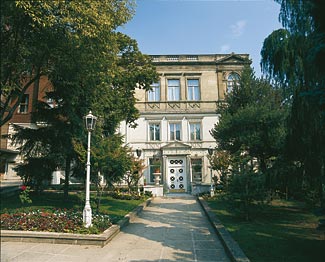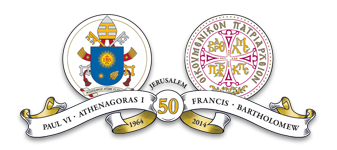The Ecumenical Patriarchate
The Ecumenical Patriarchate is the highest see and holiest center of the Orthodox Christian Church throughout the world. It is an institution with a history spanning seventeen centuries, during which it retained its see in Constantinople (present-day Istanbul). It constitutes the center of all the local Orthodox Churches, heading these not by administration but by virtue of its primacy in the ministry of pan-Orthodox unity and the coordination of the activity of the whole of Orthodoxy.
 The function of the Ecumenical Patriarchate
as center par excellence of the life of the
entire Orthodox world emanates from its
centuries-old ministry in the witness,
protection and outreach of the Orthodox faith.
The Ecumenical Patriarchate therefore
possesses a supra-national and supra-regional
character. From this lofty consciousness and
responsibility for the people of Christ,
regardless of race and language, were born the
new regional Churches of the East, from the
Caspian to the Baltic, and from the Balkans to
Central Europe. This activity today extends to
the Far East, to America and Australia.
The function of the Ecumenical Patriarchate
as center par excellence of the life of the
entire Orthodox world emanates from its
centuries-old ministry in the witness,
protection and outreach of the Orthodox faith.
The Ecumenical Patriarchate therefore
possesses a supra-national and supra-regional
character. From this lofty consciousness and
responsibility for the people of Christ,
regardless of race and language, were born the
new regional Churches of the East, from the
Caspian to the Baltic, and from the Balkans to
Central Europe. This activity today extends to
the Far East, to America and Australia.
Orthodox Christians on all continents, which do not fall under the jurisdiction of the autocephalous (independent) or autonomous (semi-independent) Churches, fall under the direct jurisdiction of the Ecumenical Patriarchate. The most important of the autocephalous Churches are the ancient Patriarchates of Alexandria, Antioch and Jerusalem (together with the ancient Archdiocese of Mt. Sinai), the Patriarchates of Russia, Serbia, Romania, Bulgaria and Georgia, as well as the Churches of Cyprus, Greece, Poland, Albania, and the Church of the Czech Lands and Slovakia. The Autonomous Churches include those of Finland and of Estonia. Consequently, the Orthodox Churches in Europe, America, Australia and Britain, which are not under the jurisdiction of the aforementioned autocephalous Churches, lie within the jurisdiction of the Ecumenical Patriarchate. All Orthodox feel that they are constituents of one essentially spiritual community, wherein "when one member suffers, so do all." It is a true sense of unity in diversity.

